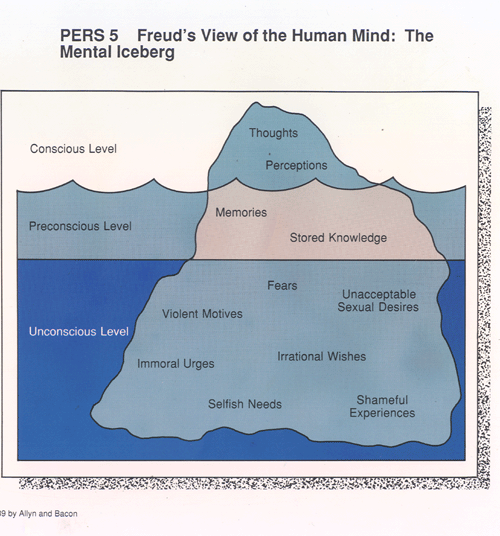|
MORE ON PSYCHOLOGY: Table of Contents for this page |
|
First the Basics:
A Bit About Psychoanalytic Criticism
ASSUMPTIONS:
- Creative writing (like dreaming) represents the (disguised) fulfillment of a (repressed) wish or fear.
- Everyone's formative history is different in its particulars, but there are basic recurrent patterns of development for most people. These particulars and patterns have lasting effects.
- In reading literature, we can make educated guesses about what has been repressed and transformed.
STRATEGIES:
- Attempt to apply a developmental concept to the work, or to the author or characters (e.g., the Oedipus complex, retentiveness, anxiety, gender confusion).
- Relate the work to psychologically significant events in teh author's or a character's life.
- Consider how repressed material may be expressed in the work's pattern of imagery or symbols.
Taken from Deborah Appleman's Critical Encounters in High School English
Applying Psychoanalytic Criticism to The Kite Runner:
CHAPTERS 1-4
The father/son relationship
- “The problem, of course, was that Baba saw the world in black and white. And he got to decide what was black and what was white. You can’t love a person who lives that way without fearing him too. Maybe even hating him a little” (15)
- “Of course, marrying a poet was one thing, but fathering a son who preferred burying his face in poetry book to hunting…well, that wasn’t how Baba had envisioned it, I suppose. Real men didn’t read poetry –and God forbid they should ever write it!” (20).
- “A boy who won’t stand up for himself becomes a man who can’t stand up to anything” (22).
- The story of Rostam and Sohrab, where the father accidentally kills his son. “Personally, I couldn’t see the tragedy in Rostam’s fate. After all, didn’t all fathers in their secret hearts harbor a desire to kill their sons?
- When Baba does not ask to read Amir’s first story, Amir is crushed. “I worshiped Baba with an intensity approaching the religious. But right then, I wished I could open my veins and drain his cursed blood from my body” (32).
- Later, “…I sat on my bed and wished Rahim Khan had been my father…I was overcome with such sudden guilt that I bolted to the bathroom and vomited in the sink” (32).
The father/son relationship is strained. Baba seems to have high expectations for Amir, so high that he does not acknowledge Amir’s individuality. It almost seems as if Baba does not “see” Amir. A psychoanalytic interpretation might help us see Baba’s actions as a way of repressing something (a fear or a guilt) concerning his son. Perhaps this is foreshadowing .
On the opposite side, Amir seems to secretly wish that Baba was not his father. This is a classic example of the Oedipal complex. Freud’s theory of the Oedipal complex was the idea that young boys harbor a secret rivalry with their father. That rivalry is usually for the mother’s affection. However, for Amir, with his mother not present, Amir seeks acceptance from where ever he can find it (Rahim). Many psychologist believe that it is impossible for a boy to become a man without going through this Oedipal crisis, without resolving their secret rivalry with their father.
"After all, didn't all fathers in their secret hearts harbor a desire to kill their sons?" - pg. 29
^ this talks about the way he thinks all fathers feel about their children
"He'd close the door, leave me to wonder why it was always grown-ups' time with him. I'd sit by the door, knees drawn to my chest. Sometimes I sat there for an hour, sometimes two, listening to their laughter, their chatter." - pg. 5
^Here, the author talks about how Amir feels when he is being rejected by his father.
RETURN TO KITE RUNNER RESOURCE PAGE
Literary Criticism and The Kite Runner:
Linked below are student developed resources to help readers better understand the depth and complexities of Khaled Hosseini'sThe Kite Runner. These pages were put together in conjunction with our study of literary criticism.
- Historical Critiques
- Formalist Critiques
- Psychoanalytic Critiques
- Archetypal/Mythological Critiques
- Feminist Critiques
- Marxist Critiques
- Reader Response Critiques